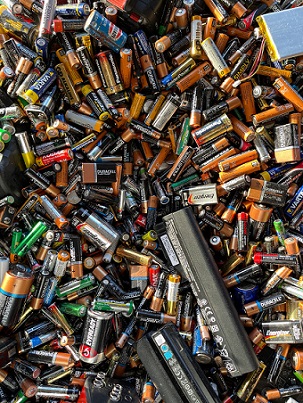 Millions of batteries are disposed of unsafely every year in the UK
Millions of batteries are disposed of unsafely every year in the UK
 All these everyday electronic devices are powered by lithium-ion batteries
All these everyday electronic devices are powered by lithium-ion batteries
 An AvSax lithium battery fire containment bag which is used by more than 100 airlines worldwide
An AvSax lithium battery fire containment bag which is used by more than 100 airlines worldwide
ALMOST half the UK’s population are flouting basic lithium battery safety rules and causing severe fires in recycling centres and bin lorries.
Lithium batteries should never be thrown into household waste but must be taken to recycling points which are often in supermarkets so they can be disposed of safely.
The fires they’re causing are costing millions of pounds in damage and potentially putting lives at risk.
There have been more than 700 fires in recycling centres and bin lorries caused by batteries in the UK over the last year – way more than was previously thought - with almost all local councils saying battery fires are an increasing and worrying problem.
That’s why companies such as Environmental Defence Systems in Yorkshire is now devising lithium battery fire containment bags for waste and recycling centres.
Its AvSax (www.avsax.com) is the world’s best-selling fire containment bag for personal electronic devices on aircraft and are now on more than 16,770 aircraft operated by over 100 airline companies. The AvSax won the prestigious Queen’s Award for Enterprise in the UK, the highest award any business in the UK can get for innovation.
Lithium batteries power all our everyday electronic devices such as mobiles phones, laptops and e-cigarettes but are also in millions of toys and these are believed to be one of the biggest causes.
People are throwing old toys and other battery-powered devices in the general rubbish or recycling bins and when they get moved or crushed in waste centres the batteries become damaged, sending them into what’s known as thermal runaway.
These fires spread rapidly as the burning batteries are surrounded by flammable rubbish and are notoriously difficult to extinguish. A lithium battery fire can reignite hours later.
The research was carried out by Material Focus, a not-for-profit organisation whose aim is to stop the nation throwing away or hoarding old small electricals, to raise awareness of a new Stop Battery Fires Campaign by website Recycle Your Electricals.
To find your nearest battery recycling point simply click here and pop your postcode in the search box https://www.recycleyourelectricals.org.uk/electrical-recycling-near-me/
The latest research follows similar research conducted by the Environmental Services Association (ESA) in 2021 which identified that 201 fires were caused by battery fires. Although the two pieces of research followed different methodologies, Material Focus research indicates that fires caused by batteries are potentially a far bigger issue than previously reported.
Research conducted by Material Focus after Black Friday 2022 discovered that more than 53 million electrical items are likely to be bought in the five weeks from Black Friday to Christmas Eve in the UK. That means an awful lot of old devices may be thrown away in the coming weeks.
Material Focus also found that up to 45% of people are unaware of the fire risk if they don’t safely dispose of batteries with a quarter throwing them away unsafely.
In short, always recycle all your batteries and be sure to remove them from all toys and electronic devices before recycling those too. If the batteries can’t be removed then give them to staff at council waste disposal centres and they will be recycled separately.
Electricals containing batteries that tend to be discarded the most are smaller and frequently used such as toothbrushes, shavers, chargers and toys. These items with the ‘hidden batteries’ also tend to be the electricals that people don’t realise contain batteries.
Lithium-ion batteries are responsible for almost half of all waste fires in the UK each year according to the Environmental Services Association, costing some £158 million annually to waste operators, fire services and the environment.
A waste lorry driver with Buckinghamshire Council who has experienced a fire in his vehicle said: “In the space of a couple of minutes it went from a bit of smoke to 2ft flames leaping out of the truck.
“On this occasion we were lucky as we could get to a safe place which meant no-one was hurt but if we were on a residential street it could have caused untold damage. As it is, our trucks are often seriously damaged by these kinds of fires causing hundreds of thousands of pounds of damage.”
A London Fire Brigade spokesperson added: “We are especially concerned about fires involving lithium-ion batteries which we are seeing an increase in and can be very serious.”